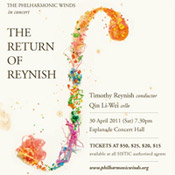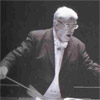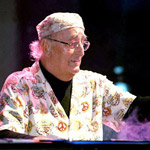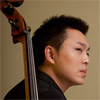Concert Review - Philharmonic Winds 30th April 2011

R: Repertoire
A varied well-constructed programme of significant pieces
- Marching Song of DemocracyPercy Grainger
- Cello ConcertoFriedrich Gulda
- FarewellAdam Gorb
- Danceries Set 2Kenneth Hesketh
A: Acoustics
Concert held in the Esplanade, Singapore, one of the world's great acoustics
M: Media
Concert was recorded, and hopefully will be put up on YouTube
P: Press
Review below from The Straits Times, Singapore's leading daily newspaper
THE RETURN OF REYNISH / The Philharmonic Winds
Esplanade Concert Hall / Saturday (30 April 2011)
Tou Liang Chang, classical music reviewer for the Straits Times
This review was published in The Straits Times on 2 May 2011 with the title "Bright brass and a bawling baby".
The measure of how a local performing group has matured and come of age may be gauged by the sophistication of its programming and the guest artists it performs with. The Philharmonic Winds, now in its eleventh year, has long gone beyond the stage of mundane marching band repertoire to embrace the most catholic of works. This concert was proof of that.

Led by the universally respected British wind band maestro Timothy Reynish (left), Singapore's premier wind ensemble opened with Percy Grainger's Marching Song Of Democracy. There were no actual voices, but the bright burnished tone of the brass provided that feel of Elgarian noblesse, with all those warm fuzzy virtues of equality and freedom alluded to in its title.

The next work was also the strangest, the unclassifiable 1980 Cello Concerto by eccentric Viennese pianist Friedrich Gulda (left), well-known for jazz forays and sometimes performing stark naked. Its five movements flitted awkwardly between hard rock, disco, classical, avant-garde, Alpine folksong and circus music, as if announcing, "To be taken with a huge pinch of salt".

The presence of drum-set and guitar on stage said it all, but it was hotshot cellist Qin Li-Wei's no nonsense approach to its schizophrenic mood swings and musical leaping through hoops that impressed most. The central cadenza was worthy of Shostakovich, providing several truly serious minutes until the bawling of a baby (how was that smuggled through Esplanade security?) provided an ironic twist to the proceedings.

True sobriety came in Adam Gorb's Farewell (composer left), a work so severe that its themes and ideas had to be explained by the grandfatherly Reynish in a pre-performance preamble. The work essentially pitted two opposing ensembles, one playing aggressive and darker-hewn themes against another of a lighter and more congenial mien.
After a series of soliloquys, the coming together of both ensembles provided the 20-minute-long work's most euphonious moments, before closing quietly with superb solos from clarinettist Desmond Chow and oboist Tay Kai Tze in close counterpoint.

The gloomy symbolism then gave way to Kenneth Hesketh's Danceries (Set II, composer left), a suite of antique English dances from Playford's Dancing Master dressed up in modern garb. While the 17th century melodies were mostly retained, the new sonorities benefited from the orchestra's ever-responsive ensemble that lacked nothing in character or cohesion. How band music has progressed from its humble origins,